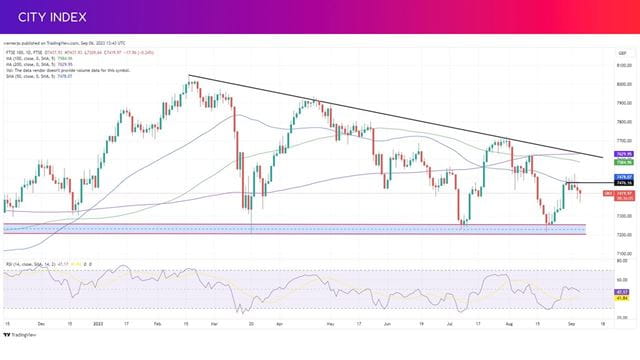
FTSE rebalance: September 2023
It’s time for another reshuffle of the FTSE 100 and FTSE 250 to reflect the latest movements in the markets. The quarterly review decides which stocks are in what index based on their valuations.
The latest review was based on the market caps at the close of trade on August 30 and will be implemented at the end of trade on September 15, with the stocks to trade in their new index from the open of trade on September 18.
You can find out more about what the FTSE rebalance is and how it works at the bottom of this page.
FTSE 100 index review
Below is a table outlining which stocks are being promoted from the FTSE 250 into the FTSE 100, and which companies they will be replacing as they are ejected out of the FTSE 100 and relegated to the FTSE 250:
|
Promoted to the FTSE 100 |
Relegations from FTSE 100 |
|
Dechra Pharmaceuticals |
Abrdn |
|
Diploma |
Hiscox |
|
Hikma Pharmaceuticals |
Johnson Matthey |
|
Marks & Spencer Group |
Persimmon |
FTSE 250 index review
Below is a table outlining which companies have been promoted into the FTSE 250, and the stocks that have lost their place in the index and will be relegated into the FTSE All-Share. Importantly, those being relegated from the FTSE 100 will also be joining the FTSE 250:
|
Promoted to the FTSE 250 |
Relegated from the FTSE 250 |
|
888 Holdings |
Capita |
|
Breedon Group |
CMC Markets |
|
CAB Payments |
Molten Ventures |
|
Ceres Power |
Synthomer |
|
Foresight Group |
Vanquis Banking Group |
|
Moonpig |
Warehouse REIT |
M&S to return to the FTSE 100
Marks & Spencer Group lost its place in the FTSE 100 for the first time ever back in 2019 after it struggled to deal with the shift to online shopping and failed to convince investors about its grocery joint venture with Ocado. However, we have seen a revival this year considering the stock is up over 76% since the start of 2023, with investors regaining confidence as it progresses with its turnaround. This will thrust the company back into the blue-chip index this month. It has rejigged its store estate, improved its online offering, revamped its clothing range, reduced costs and its food remains in favour with customers despite the cost-of-living crisis. That saw Marks & Spencer report strong like-for-like growth in its latest update for both food and clothing, although the outlook ahead remains challenging.
Diploma re-rating leads to promotion
Diploma - which distributes an array of products like wires and cabling, seals, and medical devices - is entering the blue-chip index after impressing the markets with its interim results released back in May, when sales, margins, profits, cashflow and the dividend all experienced stellar double-digit growth, while it also raised its outlook. That prompted a re-rating of the stock.
Hikma earns blue-chip status after 11-month rally
Hikma Pharmaceuticals is moving up a tier after it climbed to 19-month highs in early August as investors embraced news it had raised its sales and margin guidance for its generics business. The stock has been steadily recovering over the past 11 months, having risen almost 75% since bottoming-out in October 2022.
Dechra rises to FTSE 100 thanks to takeover
Meanwhile, Dechra Pharmaceuticals is being promoted after it saw its share price pop back in April when it became a takeover target. The company, which makes medicines for animals, has been in the process of being purchased by EQT since agreeing to terms back in June. It is expected to be completed in late 2023 or early 2024, suggesting Dechra will not be in the FTSE 100 for too long.
Persimmon to leave FTSE 100
Persimmon is losing its blue-chip status after being one of the hardest hit by the slowdown seen in the UK housing market this year, as rising interest rates and inflationary pressures push the housing ladder out of reach for more people. The company has been particularly hurt because it is more exposed to first-time buyers that are having a tough time financing their purchases in the current climate. That has prompted it to reduce the number of houses it builds, and that reduced scale combined with higher costs has also pressured profitability. Persimmon shares are down almost 20% this year while rivals like Barratt and Berkeley Group have gained ground, making it a huge underperformer. Conditions are likely to remain challenging until at least next year, with markets waiting for rates to peak and hoping for cuts – although the lag effect of monetary policy means it could take longer for conditions to improve for housebuilders.
Abrdn outflows causes it to fall out of favour
Abrdn fell out of favour in August, when it triggered a selloff after reporting a fall in assets under management and net outflows as investors pulled their money out of equity funds and took advantage of money market and fixed-income funds. We discovered that June was one of the worst months in terms of money flowing out of equity markets on record, according to a report from Calastone. The stock has plunged over 30% since the start of August.
Hiscox: Fall from grace
Insurer Hiscox saw its share price climb to its highest level in over three years back in May, but then came under extreme pressure. Notably, that selloff coincided with news it had appointed Jonathan Bloomer, the former CEO of Prudential, as its chair designate after Robert Childs retired at the end of May. Hiscox has remained on the right path in 2023 with revenue and profits growing following years of hard work refocusing its portfolio, but ultimately it missed expectations in August and this pushed shares to nine-month lows. Retail growth has temporarily tempered due to more intense competition and this has weakened the outlook.
Johnson Matthey comeback wasn’t enough
Johnson Matthey has been making something of a comeback since hitting 12-year lows in August, but it has not been enough to save its place in the FTSE 100. News that US outfit Standard Latitude Master Fund doubled its stake in the company to 10% at the start of September provided a strong signal that the selloff had been overdone and led to a revival in its share price, although it is still trading some 18% lower today than at the start of 2023. That has also fuelled speculation that it could be a takeover target, especially as the investor has previously bought a chemicals company after amassing a significant stake.
FTSE 100 analysis: Where next?
The FTSE 100 has continued to set a series of lower-highs since peaking in February, but has also found a reliable floor. This wedge continues to narrow, which heightens the chance of a breakout in either direction going forward.
The index has unsuccessfully tested 7,473 in five of the last six sessions, suggesting this is the immediate upside target it needs to break through. Notably, this is also aligned with the 50-day moving average, reinforcing its potential to keep providing resistance. A move above here would allow it to continue its journey toward the overarching trendline that has been in play for the last seven month. We are also seeing the 200-day moving average align with this key level.
However, sellers have been making progress over the past three sessions despite a strong effort from buyers, demonstrated by the lengthy lower wicks. On the downside, buyers have reliably returned to the market whenever the index has slipped below 7,250, although it has managed to sink to as low as 7,200 before we have seen a reversal. This is the key support zone to watch going forward.

How to trade UK stocks and the FTSE 100
You can trade UK stocks and indices with City Index in just four easy steps:
- Open a City Index account, or log-in if you’re already a customer.
- Search for the stock or index you want in our award-winning platform
- Choose your position and size, and your stop and limit levels
- Place the trade
Or you can practice trading risk-free by signing up for our Demo Trading Account.
What is the FTSE rebalance?
The FTSE indices are reviewed once every quarter. This means the constituents of each index changes in March, June, September and December.
This ranks all of the members of the FTSE 100, FTSE 250 and FTSE SmallCap indices by their market cap to determine what companies should be included in what index.
Any member of the FTSE 100 that ranks 111th or below on the day of the review is automatically demoted to the FTSE 250, and replaced by the FTSE 250 companies that have moved up the list to rank above 90.
Those FTSE 250 members that fall below a ranking of 376 are ejected from the index and replaced by companies in the FTSE SmallCap index that have moved above 325 on the list.
Importantly, the review is also a time when any new listings are taken into account. If a company has gone public since the last review and is big enough to qualify for an index, then it will be included.
Why is the FTSE index review important?
The FTSE index review is important for those stocks that are affected by the shake-up as it determines what index they sit in.
This can impact their appeal to institutional investors and pension funds that may only invest in stocks in a particular index. For example, if a stock falls out of the FTSE 100 then it also falls off the radar of any investors exclusively focused on that index and replaced by whatever stock is promoted from the FTSE 250. This is particularly true for those stocks that fall out of the FTSE 250 as they lose their place among the UK’s largest companies altogether.





